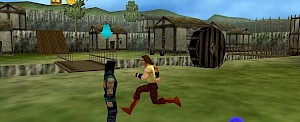Feature: I'm More Mature Than You

Posted 07 Dec 2005 at 16:43 by guest

| "Simply put, the perception of certain games as immature is wrong-headed." |
As gamers discuss their favourite pastime on internet forums there is an underlying fault line that results in some debate, an issue which often divides the gaming community � that of maturity. As the industry has grown up (and games players with it) many titles, and developers such as Nintendo, have found themselves pigeonholed as immature and strictly "for the kids". But how accurate is this view?
Nintendo gamers understand this point better than most � fans of Mario know what it is to be ridiculed for their choice in so-called "kiddy" games. Nintendo's approach generally has been one of family-friendly entertainment, with little violence (and certainly no realistic depictions). In an industry where Sony and Microsoft have cornered the guns-and-graphics market (which is made up of predominantly teenage males) Nintendo has found itself as the younger kid brother nobody wants to play with � after all, who wants to jump around in colourful, cutesy game worlds or sail a cel-shaded ocean? Everyone knows that such activities are childish compared to counter-terrorist operations or hijacking fast cards in grittily realistic cityscapes, right? Even beyond the teenage market, many older Nintendo gamers in their 20s (this author included) have found that demonstrating the merits of Pikmin or Paper Mario to adult friends more interested in Halo or GTA is a hard task.
With the original PlayStation, Sony rebooted the industry from being the exclusive pursuit of kids, geeks and coders to a multimedia platform that could be enjoyed by anyone, but mostly by a youthful, fashion-conscious audience. Sony had redefined what was cool in the gaming community, and had usurped Nintendo, which was then seen as outdated and childish. Yet it is not just the fact that Sony and increasingly Microsoft (note the recent MTV launch for Xbox 360) have carved out the teenage market for "cool", "mature" games, leaving Nintendo with Pokemon fans, but that mediocre platformers and film licences often have been excused as being "good for the kids". Not content with writing off Nintendo classics in the first instance, some "mature" gamers have Mario confused with his inferior clones like Crash Bandicoot, Blinx: The Time Sweeper, and any number of tired film cash-ins.
This is not only inaccurate, but also genuinely unfair to young gamers. Since when were below-average titles condescendingly passed off as suitable for gamers under 12? Are second-rate, technically inept film licences acceptable for the kids? Children are often discerning in their games playing and can tell the difference between a mediocre title and a good one, the perceived maturity or difficulty level of the game notwithstanding. If anyone doubts this then they should think back to their own childhood and the 8-bit or 16-bit games they loved, and consider how many of those titles have since passed into gaming halls of fame. Furthermore, back in that era there was little arbitrary division of games into those that were adult and those that were for children. Nowadays it seems that sex and violence define a game's maturity and those titles that have a cartoon-style are seen as immature. To use a movie analogy, rating violence and nu-metal soundtracks as "mature" and conversely mocking Nintendo for its colourful, family-friendly approach is akin to ranking the tedium of brainless actioner xXx as "grown-up" when compared to the subtlety and brilliance of Toy Story or Finding Nemo.
Nintendo has struggled to shrug off this "immature" label, and has made only a handful of concerted efforts in this generation to change this perception � for example, Capcom coming on board for the Resident Evil series, and the forthcoming "realistic" The Legend of Zelda: Twilight Princess. Yet the view remains the same, with Nintendo pilloried as being both babyish and an industry dinosaur. In the same spirit of trying to have it both ways, the teenage boy market playing Need for Speed: Underground and FIFA Street can deride the cartoon-style of Nintendo, and yet hype up the next cartoon-style game from former Nintendo associate Rare.
Perhaps that last comment was unfair, but it points to an underlying truth � simply put, the perception of certain games as immature is wrong-headed. The reality is that many of the dark, violent games favoured by younger males, teenagers and gamers in their 20s are depressingly juvenile and superficial, whereas there is greater depth and thought in the colorful worlds of Nintendo games. Whether it is edgy extreme sports games, street racers or shooters, Nintendo has them all beat for richness. The artistic brilliance of The Legend of Zelda, the bright humour of Paper Mario, or the tongue-in-cheek political commentary of Pikmin 2 � Nintendo finds depth in its games, infusing its titles with maturity. It is hard to do any of those mentioned games justice within the limits of this article: each one deserves consideration and praise in its own right (see my other articles on the politics of Pikmin, or the Celtic themes of The Wind Waker). Yet the fact that games forums are often alive with talk about favourite characters and scenes from Zelda games, or discussions of favourite endings or immersive moments, tells a story in itself. This goes beyond the level of shooters and racing games.
Those games rely on a disingenuous ploy, marketing guns, gangsters and graphics to a teenage male audience all too ready to accept this as adult � unsurprisingly and understandably, as we all attempted to grow out of childish habits and reach adulthood at this time. An 18-rated game packed with violence is a milestone to reach for, to be old enough and mature enough to attain it, even though that violent game is aimed cynically at those too young to legally buy it. There is little maturity in the Grand Theft Auto series; though technically exceptional the game has no moral compass, and a wry nod to the American gangster films that inspired it provide the only fleeting moments of humour. Admittedly, perhaps Rockstar designed GTA to be deliberately immature, in keeping with the cynical nature of the game. Among many gamers there has arisen the view that somehow violence equals realism, though the over-the-top nature of some violent games seems to betray this argument. The less said about po-faced, dour shooters that saturate the industry, and clumsy, awkward attempts to make gaming seem cool, the better � this holds true for the industry's at times crassly misogynist and racist attitude, a related issue that warrants a feature, or simply just a condemnation, in itself.
Moreover, efforts to subvert the Nintendo approach � best demonstrated by the recent Conker: Live and Reloaded, Rare's imitation of the Japanese developer's recognisable gameplay hooks, but with the addition of "adult humour" � can result in embarrassment. The crushing irony here is that there is precisely nothing big or clever about infantile foul-mouthed "gags" to do with bodily functions � this is about as far from mature as it is possible to be, and in attempting adult humour such games come across as being, basically, humourless.
Computer games will one day attain the level of a new art form, though the industry is not quite there yet. Nowhere is this clearer than in the adolescent industry's rush to appear mature and adult, while it forgets what that means exactly. True immaturity comes in refusing to appreciate different games and what makes those games great � artistic style, emotional depth and clever humour that is often found wanting in 18-rated titles.
Nick Bennett
[email protected]





















